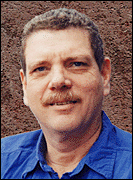

![]()
Facts of the Matter


![]()
Facts of the Matter
Doctor’s claim of human
clone due in January
raises doubts, fearsThe announcement last week by Italian doctor Severino Antinori that the first human clone was due in January of 2003 raises the question, "Because we can, does it mean that we should?" It creates ethical, moral, and legal issues that outweigh the science.
Contrary to science fiction, where adults are cloned in tanks, clones of mammals develop in utero and are born as infants. A clone is genetically identical to the donor cell from which its DNA is derived, but without the experience or memories of the donor.
The cloning of mammals, which began with Dolly the sheep in 1997, has broken a barrier that many thought should not be broken. The technique implants the nucleus of a donor cell into an egg cell from which the nucleus has been removed. This zygote is then transplanted into the uterus of a surrogate mother where it develops into an embryo and a fetus. There it grows through the term of pregnancy until birth.
Besides ethical considerations, there are serious problems with cloning humans. Although sheep, cows, pigs, mice and cats have been cloned, all have had genetic abnormalities. Less than three percent of cloned embryos survive, and those that do often have medical problems, such as defective hearts, lung and vascular problems, diabetes, and malfunctioning immune systems.
Biologists doubt Antinori's team has the expertise to clone a human, and he has refused to open his work to scrutiny, which is contrary to the "rules" of science.
A group called Clonaid, whose parent body is a sect that believes humans are the result of extra-terrestrials' genetic engineering, claimed it had five women pregnant with clones. It said a baby girl would be born in December and it would let scientists verify the child was a clone by comparing her DNA with that of the donor.
But the vast majority of cloning attempts are unsuccessful, and there is no reason to believe that it will be any different with human clones.
Although Antinori has said that ultrasound shows the fetus to be "absolutely healthy," there are potential problems that ultrasound cannot identify. In the case of the animals that have been cloned, the "defects" can be euthanized after birth, or the pregnancy terminated. Obviously this is not so easily reconcilable for human clones.
Advocates say it is now easier to identify defective embryos before they are transferred to the mother's womb, but the science is not yet precise enough to make those determinations infallibly.
Then there is the question of how to regulate cloning. There is no federal law banning cloning, but several states have passed laws that ban human cloning. The U.S. Food and Drug Administration has said that anyone in the United States must get its permission before attempting human cloning . In Japan, human cloning is a crime that is punishable by up to 10 years in prison.
These are not issues that will go away. The cloning of human beings just may turn out to be the greatest ethical issue of the 21st century.
We could all be a little smarter, no? Richard Brill picks up
where your high school science teacher left off. He is a professor of science
at Honolulu Community College, where he teaches earth and physical
science and investigates life and the universe.
He can be contacted by e-mail at rickb@hcc.hawaii.edu